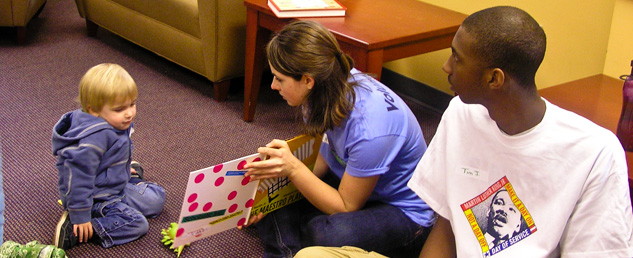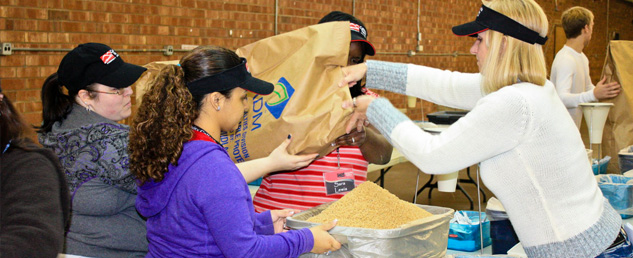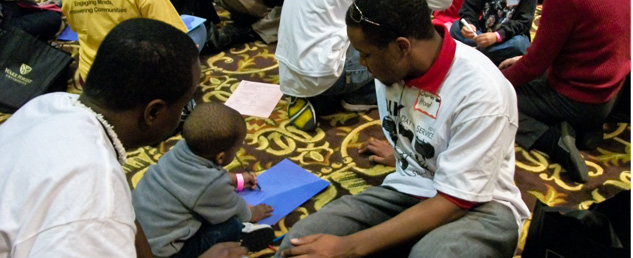NC Campus Compact
Campus Box 2257
Elon, NC 27244
Phone: 336-278-7278
Email: nccc@elon.edu
Follow us:
|
Sign up for Our Email Newsletter |
|
|
|
News
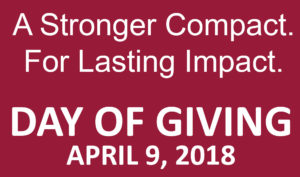 On April 9, NC Campus Compact invites friends and allies to take part in our first-ever Day of Giving. Your support will grow the HPU Challenge Fund for North Carolina Campus Compact, a special interest endowment fund created to help sustain the Compact as it works to advance civic and community engagement in higher education. On April 9, NC Campus Compact invites friends and allies to take part in our first-ever Day of Giving. Your support will grow the HPU Challenge Fund for North Carolina Campus Compact, a special interest endowment fund created to help sustain the Compact as it works to advance civic and community engagement in higher education.
Since 2002, North Carolina Campus Compact has helped colleges and universities build on their commitments to educate students for civic and social responsibility, to partner with communities for positive change, and strengthen democracy.
Your donation will keep us moving forward as we expand efforts to foster connections between campuses, share information and resources, recognize outstanding work, and champion civic and community engagement in higher education.
The HPU Challenge Fund for North Carolina Campus Compact was launched with a $200,000 gift, announced by High Point University President Nido Qubein at the 2017 NC Presidents Forum. The fund is administered by the Alamance Community Foundation, a regional affiliate of the Community Foundation of Greater Greensboro.
Donations to the fund are tax-deductible and can be made online by credit card. Your online donation will generate a receipt to your email address. (Please check your junk folder if the receipt does not appear in your inbox.)
To give by check, make check payable to “Alamance Community Foundation” AND write “NC Campus Compact” in the memo line. Mail your gift to:
NC Campus Compact, Campus Box 2257, Elon, NC 27244.
Thank you for supporting North Carolina Campus Compact and the public purposes of higher education! Learn more about the Day of Giving.
Guest post by Asia King, NC State University student and recipient of a 2017 Marshall Alternative Break Scholarship
“If you’ve come here to help me, you’re wasting your time. But if you’ve come because your liberation is bound up with mine, then let us work together.”
— Lilla Watson, Australian Aboriginal Elder
I often tell people I have never had a “real spring break.” I have been lucky to participate in four Alternative Service Break experiences, and as participants it sometimes feels as if we receive so much more out of ASB than we give back. However I know going into ASB that I am there with a purpose. I want to share so much with the community. I want to tell them that I see them, I hear them, and I stand beside them. Raising awareness is such an important part of the ASB journey. What we learn during our time in the community is not as important as what we do with it.
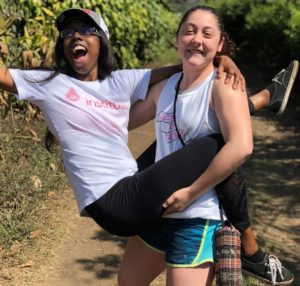 Asia King (left) joined fellow NC State students on an alternative break service trip to Guatemala this spring. My fourth and final spring break (of my undergraduate career) has been one that is difficult to digest as ASB has held such a huge space in my heart throughout my college career. I was able to serve as team leader for North Carolina State University’s Alternative Service Break Program to Guatemala focusing on Women and Gender Issues. In partnership with the Center for Student Leadership, Ethics, and Public Service and the Women’s Center our trip worked to unpack the gender roles and traditional views on gender that impact our lives daily. We worked with organizations such as the Comité Campesino del Altiplano which works to advocate for the rights of indigenous farmers by seeking global, social, economic, political and cultural change as well as ALAS de Mujeres which focuses on providing access to family planning resources as well as changing the stigma around using family planning methods.
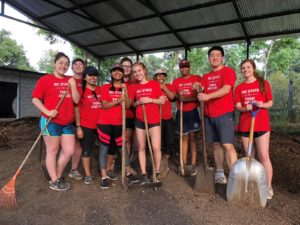
When people ask me to explain the reason behind Alternative Service Break, it is a truly difficult for me to put words to the experience. It is hard for me to explain the warmth I feel from the community members who invite us into their homes. Hard for me to explain the power of being a participant in the Women’s March and seeing the Transgender community represented. Hard for me to explain my feelings of frustration, guilt and sadness that regardless of what I do I cannot change the past and how it has affected these individuals. Hard for me to sum up that in a week I can be completely unraveled and put back together by the concept of ASB Magic. Overall ASB is more than a resume builder. More than a week. More than an experience. ASB is a journey, it’s self-reflection, its love, its power, its community and its where I have found myself and the passion within me for social change.
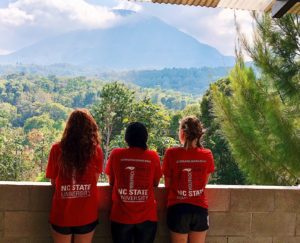
NOTE: Photos courtesy of Asia King. Asia is a senior majoring in business administration at NC State University. She received a 2017 Marshall Alternative Break Scholarship, which provides $250 to support participation in an alternative break program where the student takes a leadership role. The Marshall Scholarship application is open to all students in the NC Campus Compact network who attend the annual CSNAP Student Conference, where scholarship winners are announced. Learn more about the Marshall Alternative Break Scholarship here.
Guest Post by Natasha Kinto
I am Natasha Jones Kinto (Lumbee), a Campus Compact AmeriCorps VISTA. My host site is The Lumbee Tribe Boys & Girls Clubs and I am partnering with The University of North Carolina at Pembroke. I prepared myself for my VISTA service by reviewing my VAD, The Lumbee Tribe Boys & Girls Clubs (BGCA) mission and purpose and afterschool programs in general. I began my service year in August, just a few weeks after the new school year began. The Pembroke Boys & Girls Club, my home base, was getting a new floor so furniture was rearranged daily. The BGCA Staff were busy with daily lessons while preparing for an audit and the First Annual Lumbee Days held at the Smithsonian National Museum of the American Indian in Washington, DC. I met the other VISTA who was also assigned to the Clubs, was given a work space and instructed to begin the work listed on my VAD; day one had begun. I had feelings of being overwhelmed with the large workload and unfamiliar setting but the BGCA Staff were welcoming and accommodating. My fellow VISTA and I settled into our stations and developed an outline and a plan of action.
The VISTA Online Orientation, including the video chats and assignments, were beneficial in showing me how to break my VAD objectives and activities down into manageable tasks. I was able to conceptualize projects and develop concrete deliverables. I focused on what I knew, which was making observations, interviewing staff and getting organized. I visited each of the seven Boys & Girls Clubs where I met staff, members and volunteers. I gathered enough information to allow me to work independently and created online shared file storage for my work. I created a list of potential volunteers and donors for the seven Boys & Girls Clubs which serves as a current and future resource. I was also able to focus my attention on the larger VISTA mission of fighting poverty. I knew that my work should be sustainable by future VISTAs, BGCA Staff and/or volunteers with the goal of addressing poverty.
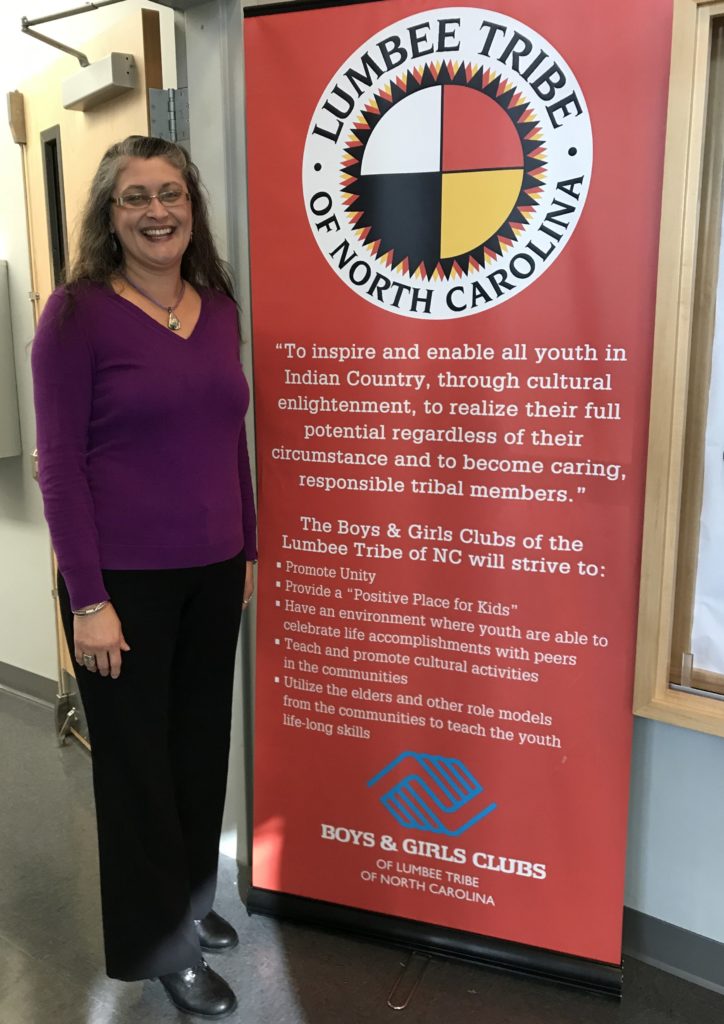
My once in a lifetime experience as a VISTA came quickly in September as I was invited to attend Lumbee Days in Washington, D.C. with the Lumbee Tribe and the Boys & Girls Clubs. I treated the trip as an immersion experience and spent five days and four nights with approximately seventy-five club members and thirty club staff, as well as local leaders. We rode buses, participated in a Wreath Laying Ceremony at Arlington National Cemetery in Virginia and explored D.C. on foot. We spent two full days at the Museum of the American Indian sharing the story of the Lumbee People with the world. The D.C. trip allowed me to reconnect with former colleagues and make new alliances.
Many local leaders, educators, story tellers and crafts people have voiced support of the initiatives of the Boys & Girls Clubs. Through my VISTA assignment, I have gained first-hand knowledge of tribal government, including protocol and etiquette. I have learned of the many struggles that our tribal members face, such as health gaps, access to services and educational needs. The VISTA program has provided me with an opportunity for growth and personal development as I have worked to address poverty in my community. During the second half of my year of VISTA service, I will complete my VISTA tasks. I will also finish my portfolio project and presentation so that I may showcase my efforts and how they will benefit my community. With the information that I have gained, I will continue to provide the needed services to my community, even after my VISTA service year is over. I encourage anyone who is interested in community service to consider the Campus Compact AmeriCorps VISTA program.
We are NOW RECRUITING FULL-YEAR MEMBERS for service terms beginning July 16! Learn more: bit.ly/goNCAfterschoolCorps
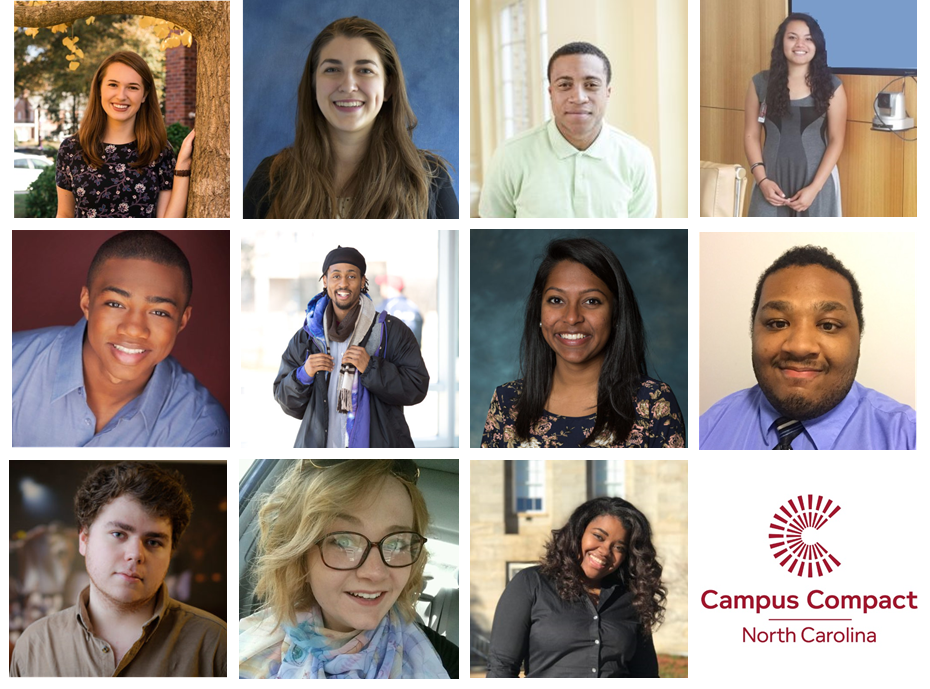
Campus Compact, a Boston-based non-profit organization working nationwide to advance the public purposes of higher education, has announced the 268 students who will make up the 2018 cohort of Newman Civic Fellows. There are 12 fellows from colleges and universities in our North Carolina Campus Compact network.
The Newman Civic Fellowship is a one-year fellowship for community-committed college students from Campus Compact member institutions. The fellowship honors the late Frank Newman, one of Campus Compact’s founders and a tireless advocate for civic engagement in higher education.
In the spirit of Dr. Newman’s leadership, Campus Compact member presidents and chancellors are annually invited to nominate one community-committed student from their institution for the fellowship. These nominees are individuals who have demonstrated an investment in finding solutions for challenges facing communities throughout the country and abroad.
Through the fellowship, Campus Compact provides a variety of learning and networking opportunities, including a national conference of Newman Civic Fellows in partnership with the Edward M. Kennedy Institute for the United States Senate. The fellowship also provides fellows with pathways to apply for exclusive scholarship and post-graduate opportunities. Fellows from North Carolina Campus Compact will receive complimentary registration to attend the annual CSNAP Student Conference. The 2018 CSNAP Conference will be held at Fayetteville State University on November 9-10.
“We are thrilled to have the opportunity to celebrate and engage with such an extraordinary group of students,” said Campus Compact president Andrew Seligsohn. “The stories of this year’s Newman Civic Fellows make clear that they are bringing people together in their communities to solve pressing problems. That is what Campus Compact is about, and it’s what our country and our world desperately need.”
The Newman Civic Fellowship is supported by the KPMG Foundation and Newman’s Own Foundation.
Congratulations to the 2018 Newman Civic Fellows from North Carolina Campus Compact member schools:
East Carolina University – Haley Creef
Elon University – Fiona Zahm
High Point University – Douglas McCollum
Meredith College – Leslie Arreaza
North Carolina Central University – Jordan Thomas
Pfeiffer University – Kristina Everhart
University of North Carolina at Asheville – Daniel Suber
University of North Carolina at Charlotte – Sreevidhya (Vidhya) Balasubramanian
University of North Carolina at Greensboro – Terrell Saunders
Wake Forest University – David Ajamy
Western Carolina University – Fiona Buchanan
William Peace University – Maiah Overton-Ashford
NC Campus Compact has recognized two outstanding administrators as our 2018 Civic Engagement Professionals of the Year. Charlotte Williams of Lenoir-Rhyne University received the “Sustainer Award” for her 19 years of civic engagement leadership, and Tamara Johnson of UNC Charlotte received the “Emerging Leader Award” for the significant contributions she has made to campus civic engagement in just five years. Both Williams and Johnson were honored at the 2018 NC Presidents Forum, held at Meredith College on February 9.
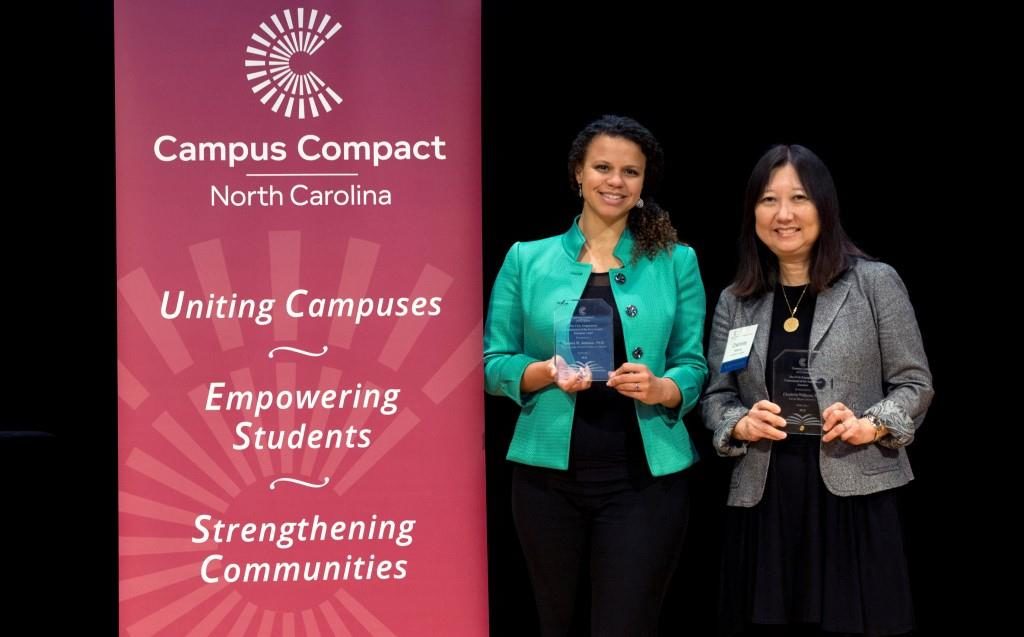 The 2018 Civic Engagement Professionals of the Year: Tamara Johnson (left) of UNC Charlotte and Charlotte Williams (right) of Lenoir-Rhyne University. For nearly two decades, Charlotte Williams has been an architect of Lenoir-Rhyne University’s community engagement programming.
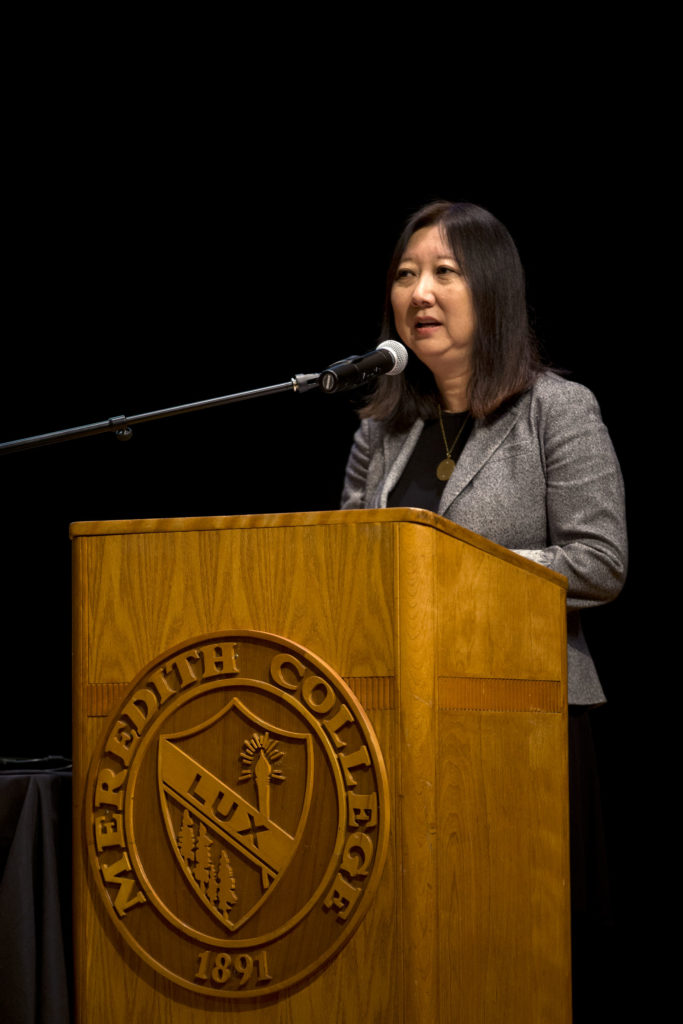 Charlotte Williams accepts the Civic Engagement Professional of the Year “Sustainer” Award at the President Forum held on Feb. 9 at Meredith College. Williams first came to Lenoir-Rhyne University (LR) in 1999 as a visiting assistant professor and coordinator of the human and community services (HCS) program. Today she serves as Associate Dean for Engaged and Global Learning, and she continues to coordinate the HCS program. Participation in the program has doubled during her tenure. Through her teaching, administration, and civic leadership, Ms. Williams has touched the lives of countless LR students and local citizens.
Williams supports co-curricular service as well, promoting the annual Hands On Hickory event and serving as an advisor to the Circle K club. For several years, she served as the university’s liaison to NC Campus Compact, supervised Lenoir-Rhyne’s AmeriCorps VISTA member, and managed an NC-ACTs grant which provided community service scholarships to students. In 2014, she was honored with the university’s “Outstanding Student Organization Faculty Advisor Award.”
Ms. Williams also models civic leadership. Last fall, she was appointed by the Governor to serve on the NC Human Relations Commission. Previously, she was elected and served two terms on the Hickory Board of Education, and she has served on numerous non-profit boards, including the boards of the United Arts Council of Catawba County, Catawba County Habitat for Humanity, and Cognitive Connection, a local substance abuse program. In 2008, she received LR’s “Community Service Award.” She was also honored by the Hickory Schools Foundation with the “Outstanding Community Partner Award, 2014-15.”
Ms. Williams received her bachelor’s of social work from the University of Illinois at Urbana-Champaign, and her master’s of arts from the University of Chicago. Earlier in her career, she worked for the City of Chicago as Assistant Commissioner of Planning and as Assistant Deputy Mayor for Community Services.
Over the course of her relatively short tenure at UNC Charlotte, Tamara Johnson has shaped the civic engagement landscape and mapped new pathways that connect students and community.
Her official position – “Research Associate for Academic Planning and Analysis” in the Office of Academic Affairs – belies her significant civic engagement responsibilities.
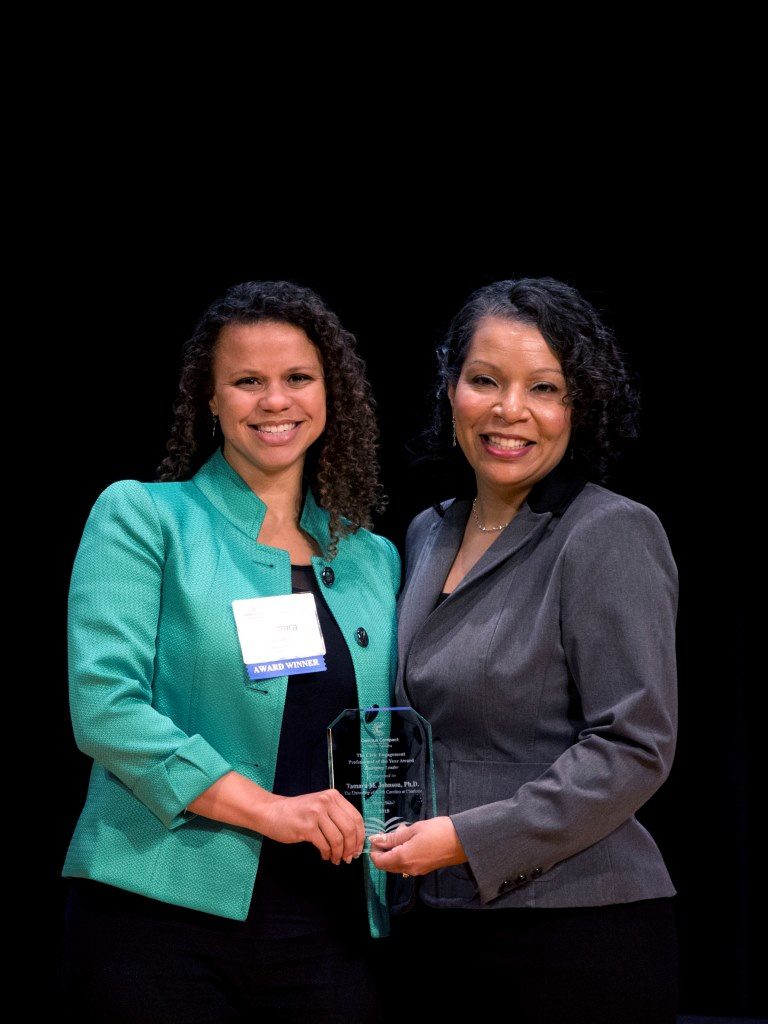 Tamara Johnson accepted the Civic Engagement Professional of the Year “Emerging Leader” Award from Leslie Garvin, executive director of NC Campus Compact. As the coordinator of the university’s North Carolina Campus Compact working group, Johnson oversees efforts to enhance the practice of community-based learning. In 2015, she was instrumental in establishing UNC Charlotte’s biennial Engaged Scholarship and Community Partnership Symposium. She led committees that organized gatherings for campus and community members around key local issues: Hunger in Charlotte in 2016 and Housing Affordability in 2017. Last fall, she was a key ally for a student-led project to bring Charlotte-Mecklenburg police to campus for a conversation with students and community members about police-involved shootings. Johnson is currently leading UNC Charlotte’s development of a Civic Action Plan. The plan aims to create a set of strategic initiatives that align teaching, research, and service around an urgent community need: economic mobility.
“Tamara acts in ways that catalyze change by serving as the momentum and connection in a system that is decentralized and prone to silos,” says UNC Charlotte Provost Joan Lorden.
Johnson is also committed to student engagement. Since 2014, she has chaired the 49er Democracy Experience, a group of students who seek to engage peers in elections and democratic action. Their collective efforts in 2016 engaged hundreds of student voters and helped UNCC be recognized as a “Voter Friendly Campus.”
Working with colleagues in the Dean of Students office, Johnson also co-founded and co-leads UNC Charlotte’s Bonner Leaders program, which welcomed its first cohort in the fall of 2016. A four-year campus-community collaboration that uses federal work-study funds to subsidize public service, the program places students at local non-profit partners.
Johnson also teaches as an adjunct faculty member in the Global Studies department. In 2015 and 2016 she led summer study abroad trips to Cape Town, South Africa, where she once served as a Peace Corps volunteer.
Johnson received her bachelor’s degree in geography and international studies from the University of North Carolina at Chapel Hill, where she later completed her Ph.D. in geography. Before arriving at UNC Charlotte in 2012, she was an instructor at UNC-Chapel Hill, UNC Charlotte, and the University of Cape Town.
UNCC story on Tamara.
(Photos by Andrew Krech)
Published
February 14, 2018
Dr. Annie Jonas of Warren Wilson College has received North Carolina Campus Compact’s 2018 Engaged Faculty Award.
 Photo courtesy of Warren Wilson College. The statewide award recognizes an outstanding faculty member in the NC Campus Compact network who demonstrates excellence in community-based teaching, research, and scholarship; leadership of campus-wide efforts; and development of strong partnerships with the community.
The faculty award was created in 2006 as the Robert Sigmon Service-Learning Award and was re-named this year.
Jonas has been a professor of education at Warren Wilson College since 2005 and chair of the education department since 2011. Her teaching – which integrates community-based experience and service – has influenced many future teachers and enhanced education for countless young people. Her “Educational Psychology” course, for example, has been in partnership with a local K-8 charter school for sixteen semesters.
The community-based learning in her courses makes a lasting impression. A former student who is now a teacher said she “vividly remember[s] working with a local middle school science teacher and his students to craft my first ever lesson on genetics.”
She continued: “Without Annie’s passion for community engagement, and the powerful, formative experiences she enabled me to have, I would not be the same educator that I am today.”
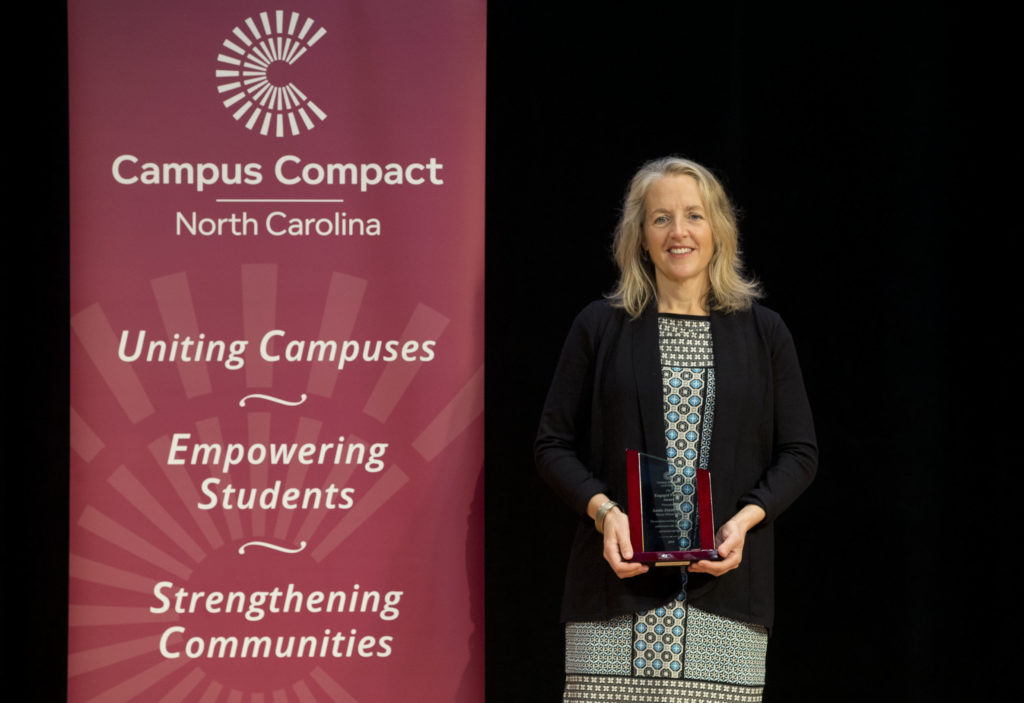 Dr. Annie Jonas of Warren Wilson College received the 2018 Engaged Faculty Award. Photo by Andrew Krech. Over the years, Jonas has also become a faculty leader of community engagement. She was a participant in the college’s Service Learning Fellows program, then served as the Faculty Liaison to the Service Learning Program. She is now Director of Faculty Community Engagement. She leads faculty workshops on experiential education and service-learning, advises and consults with colleagues, and distributes her knowledge by presenting research at conferences like PACE and the Gulf South Summit. She also serves as associate editor for the Journal of Experiential Education.
In 2015, Jonas was selected as an “Engaged Faculty Scholar” by North Carolina Campus Compact, one of two faculty members chosen for the program’s inaugural term. In this role, Jonas explored developmental aspects of “civic identity” and how the school’s first year seminar might intentionally foster this growth.
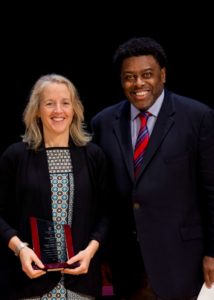 Dr. Jonas and UNC Greensboro Chancellor Frank Gilliam, who presented the award on behalf of the Compact’s Executive Board. Photo by Andrew Krech. Building on this work, Jonas and other colleagues defined civic identity as a learning outcome for the first year seminar course in the fall of 2016. The group then conceived a developmental model of civic identity, and support for the concept spread. In fall of 2017, the college Cabinet approved civic identity as the primary educational outcome for all Warren Wilson College students, which speaks to Jonas’s institutional leadership.
“Without hesitation, I attribute much of this success to Annie,” writes a colleague. “Her research and understanding of civic identity, skilled listening, consideration of various perspectives, and ability to synthesize feedback allowed for this success.”
Jonas earned her bachelor’s degree in psychology from Guilford College, a master of education and a secondary teaching certificate from Harvard University, and her doctorate in education from Western Carolina University. Before her career in higher education, she was the executive director of a wilderness experience program for low-income kids, director of the Project POWER AmeriCorps program in Buncombe County, and a public school teacher in Provincetown, Massachusetts.
The Compact recognized Jonas at its annual Presidents Forum, hosted by Meredith College in Raleigh on February 9. More than 30 presidents and chancellors attended the one-day event, along with other college and university administrators. She was also recognized at the network’s PACE Conference at Elon University on February 14. The conference convened 200 faculty, staff, students, and community partners from over 30 campuses across the Southeast.
Jonas is the first faculty member from Warren Wilson College to receive the network’s faculty award.
Published
February 9, 2018
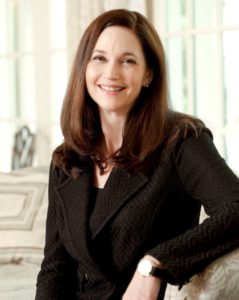 Davidson College President Carol Quillen (photo courtesy of Davidson College) North Carolina Campus Compact, a network of colleges and universities committed to civic and community engagement, has honored Davidson College President Carol Quillen with the 2018 Leo M. Lambert Engaged Leader Award.
The award is named for Elon University President Leo M. Lambert, who helped found the civic engagement network in 2002 and served as its first Executive Board Chair. Lambert has led Elon University since 1999.
The Lambert Award is presented each year to one college or university president or chancellor in North Carolina for leadership that fosters student engagement and impacts the community. The honoree is chosen by fellow campus leaders whose institutions are part of the Compact.
Quillen is the seventh president or chancellor to receive the Lambert Award, which was first presented in 2012.
Since 2011 when she became Davidson College’s eighteenth president, Quillen has championed Davidson’s civic mission and focused on preparing students to lead and innovate in the service of something larger than themselves.
Quillen’s support for collaborative research has given Davidson students opportunities to produce new knowledge, whether working with faculty in the classroom or entrepreneurs in the community. A new graduation requirement approved in 2016 has students taking at least one course that explores justice, equality, and community. Major gifts from the Duke Endowment are enhancing inclusive pedagogy and interdisciplinary learning.
Quillen has helped create immersive, community-based experiences like the Education Scholars, a summer program for students seeking to drive change in Charlotte’s K-12 education system. Another program — the Davidson Impact Fellows – pairs recent graduates with local nonprofit agencies to address critical social issues. In 2014, Quillen saw the launch of the Davidson College Advising Corps, a partnership with the National College Advising Corps to place Davidson graduates as college mentors at under-resourced schools.
Nationally, Quillen has become a spokesperson for access and affordability in higher education. She served on President Obama’s Advisory Council on Financial Capability for Young Americans in 2014-2015. She has continued to strengthen the Davidson Trust, which allows the college to practice need-blind admission and meet 100 percent of demonstrated need for all students through a combination of grants and campus employment. In 2016, Davidson became a founding member of the American Talent Initiative (ATI), one of 30 distinguished colleges and universities seeking to expand the number of talented low- and moderate-income students at America’s top-performing institutions.
Quillen grew up in New Castle, Delaware. She earned a bachelor’s in American history from the University of Chicago, and received a Ph.D. in European history from Princeton University. She came to Davidson from Rice University, where she served as vice president for international and interdisciplinary initiatives.
Davidson College joined North Carolina Campus Compact in 2007, and Quillen served on the organization’s Executive Board from 2011 to 2017.
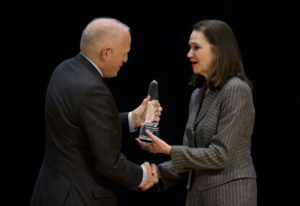 Presidents Lambert and Quillen (photo by Andrew Krech) The Compact recognized Quillen at its annual Presidents Forum, hosted by Meredith College in Raleigh on February 9. More than 25 presidents and chancellors attended the one-day event, along with other college and university administrators.
The forum included keynote remarks by Dr. Lynn Pasquerella, president of the American Association of Colleges & Universities, and Dr. Matthew Hartley, Associate Dean for Academic Affairs and Professor of Education at the University of Pennsylvania. Attendees also took part in a facilitated discussion – led by Meredith College political scientist Dr. David McClennan and retired NC Supreme Court Justice Robert Orr – that examined the role of campuses in fostering free speech and civility.
The 2018 Lambert Engaged Leader Award is sponsored by the Piedmont Service Group. The forum is sponsored in part by Aramark.
North Carolina Campus Compact is a statewide coalition of 37 public, private, and community colleges and universities that share a commitment to civic and community engagement. The network was founded in 2002 and is hosted by Elon University. North Carolina Campus Compact is an affiliate of the national Campus Compact organization, which claims 1,000 member schools representing nearly 2 million college students.
|
 On April 9, NC Campus Compact invites friends and allies to take part in our first-ever Day of Giving. Your support will grow the HPU Challenge Fund for North Carolina Campus Compact, a special interest endowment fund created to help sustain the Compact as it works to advance civic and community engagement in higher education.
On April 9, NC Campus Compact invites friends and allies to take part in our first-ever Day of Giving. Your support will grow the HPU Challenge Fund for North Carolina Campus Compact, a special interest endowment fund created to help sustain the Compact as it works to advance civic and community engagement in higher education.
